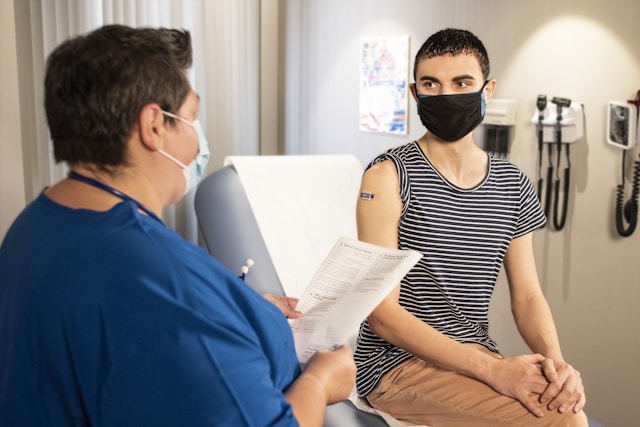
The Crucial Role of Nurse-Patient Communication
Nurse-patient communication stands at the heart of effective and compassionate healthcare. It is a dynamic process that involves exchanging information, building rapport, and fostering a therapeutic relationship. Effective communication is instrumental in ensuring patients receive the highest quality of care and feel supported throughout their healthcare journey.
Understanding Nurse-Patient Communication
Nurse-patient communication goes beyond conveying medical information. It encompasses actively listening to patients’ concerns, demonstrating empathy, and providing emotional support. Understanding the nuances of non-verbal cues and cultural sensitivities enhances the quality of communication, contributing to a more holistic approach to patient care.
Strategies for Effective Communication

Active Listening
Active listening is a cornerstone of effective nurse-patient communication. It involves fully concentrating, understanding, responding, and remembering what the patient communicates. By actively listening, nurses validate patients’ experiences, encourage them to share more information, and build trust.
Empathy and Compassion
Empathy and compassion are powerful elements in nurse-patient communication. Demonstrating genuine concern for patients’ well-being fosters a sense of connection and trust. Understanding and acknowledging patients’ emotions contribute to a compassionate care environment.
Clear and Simple Language
Using clear and simple language is essential to ensure patients comprehend medical information. Avoiding jargon and technical terms, and instead, conveying information in a way that patients can understand, empowers them to make informed decisions about their care.
Building Trust and Rapport

Building trust and rapport is a continuous process in nurse-patient communication. Trust is established through open and honest communication, consistency, and respecting patients’ autonomy. A strong nurse-patient relationship positively influences patient satisfaction and compliance with treatment plans.
Overcoming Communication Challenges
Communication challenges in healthcare may arise due to language barriers, cultural differences, or patients’ emotional states. Nurses can overcome these challenges by using interpreters when necessary, being culturally competent, and adapting communication styles to meet individual patient needs. Addressing communication challenges ensures equitable and patient-centered care.
The Impact on Patient Outcomes

Effective nurse-patient communication directly influences patient outcomes. Patients who feel heard, respected, and understood are more likely to adhere to treatment plans, participate in their care, and report any changes in their health. Positive communication contributes to improved patient satisfaction and overall healthcare experiences.
Training and Development for Nurses
Training and development programs for nurses play a pivotal role in enhancing communication skills. Ongoing education on communication strategies, cultural competency training, and simulation exercises can empower nurses to navigate diverse communication scenarios and provide patient-centered care.
Final Thoughts
In conclusion, nurse-patient communication is a multifaceted skill that is integral to the delivery of quality healthcare. It requires active listening, empathy, clear language, and the establishment of trust. By recognizing the importance of effective communication, nurses contribute to positive patient outcomes and the overall well-being of those under their care.
FAQs:
Why is nurse-patient communication important?
Nurse-patient communication is crucial because it fosters a therapeutic relationship, ensures patients receive quality care, and contributes to positive healthcare experiences. Effective communication allows nurses to understand patients’ needs, provide support, and collaborate on treatment plans.
What are some barriers to effective nurse-patient communication?
Barriers to effective nurse-patient communication may include language differences, cultural variations, emotional states of patients, and the use of medical jargon. Overcoming these barriers involves using interpreters, being culturally competent, and adapting communication styles to meet individual patient needs.
How does empathy impact nurse-patient communication?
Empathy is a fundamental element in nurse-patient communication. It allows nurses to understand and share patients’ emotions, fostering a sense of connection and trust. Demonstrating empathy contributes to a compassionate care environment and positively influences patient experiences and outcomes.
You may also like
Does nursing have math?
In this article, we’re diving into a common question that often arises among aspiring and…
What type of nurse makes the most money?
Welcome to Nursingshoeshunt.com, where we not only walk you through the best footwear for nurses…
Skechers Performance Women’s Go Walk 3 Lace-Up Review
Establishing a healthy lifestyle is important, a daily walking-based routine will make you feel young…
Nursing During Disasters: Preparedness, Response, and Lessons from Recent Crises
The Vital Role of Nurses in Disaster Response Nurses play a vital role in disaster…
Alegria Debra Women’s Slip-On Review
Alegria Debra women`s slip-on is an imported nursing shoe that is made of the following:…
Alegria Women’s Belle Mary Jane Flat Review
The Alegria Women’s Belle Mary Jane Flat shoe is the perfect nurse shoe which features…






